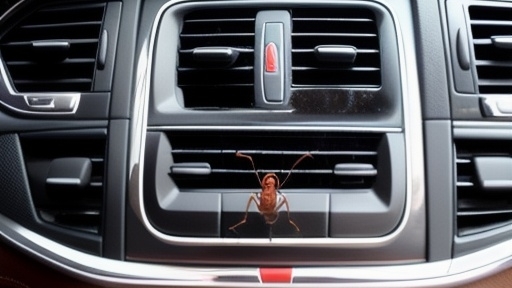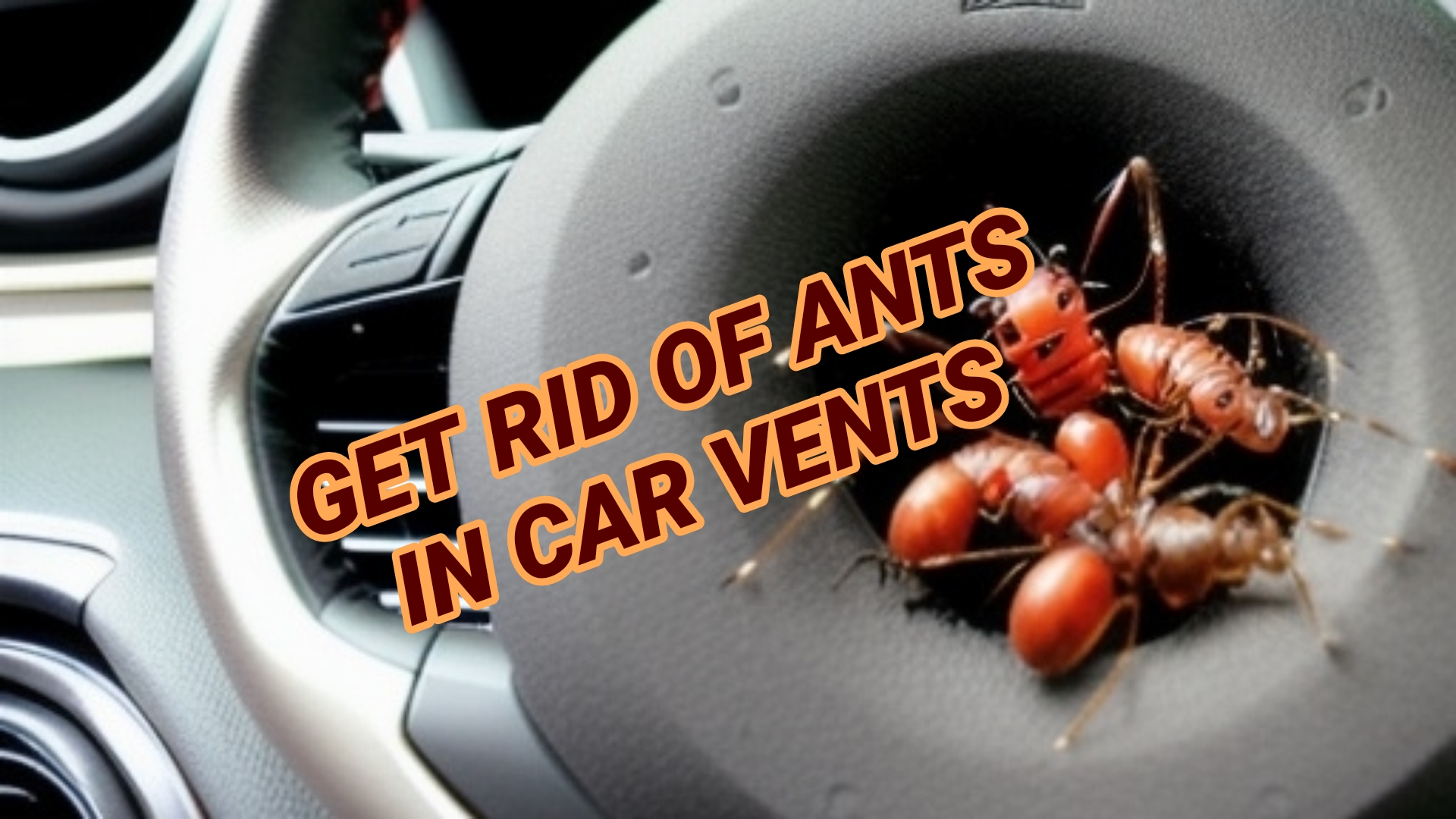It can be annoying to find ants crawling inside your car, disrupting your peaceful drive. If they are coming from your car’s ventilation system, it is essential to address the issues fast. Or else it can obstruct airflow, cause unpleasant odors, and potentially damage your car’s ventilation system.
But how to get rid of ants in car vents? To get rid of ants in car vents, clean your car thoroughly, use natural remedies like peppermint oil or vinegar, place ant traps near vents, and seal any openings. Eliminate ants and enjoy a pest-free driving experience.
By taking swift action, you can ensure a pleasant driving experience and bid those ants farewell. Let’s dive into the detailed solutions to the ant coming out of the car vent problem, shall we?
Contents
Why are ants attracted to car vents?
Well, you know how ants have an incredible sense of smell, right? Ants are attracted to car vents because they can detect food crumbs, spills, and sweet scents that tend to accumulate in your vehicle. It’s like a buffet for them!
The warmth and airflow from the car’s ventilation system make it even more inviting for these little explorers.
What problems can ants in car vents cause?
Oh, let me tell you! Having ants in your car vents can cause quite a few headaches.

First off, ants in car vents can block the airflow of the car, which means your heating and cooling system won’t work as efficiently.
Plus, that reduced airflow might require some expensive repairs down the road.
But that’s not all. Those sneaky ants can leave behind trails of excrement, leading to unpleasant odors that can linger inside your car. Imagine driving around with that smell—no thank you!
Oh, and here’s something to consider: If you spot ants in your car vents, it might be a sign of a larger ant colony nearby. Ignoring the problem could allow them to multiply and cause even more trouble. Nobody wants a car full of ants!
So, it’s essential to take action and get rid of those ants in your car vents as soon as possible. That way, you can maintain a comfortable and clean driving experience without any unwanted passengers.
How can you tell if ants have invaded your car vents?
Alright, let’s play detective! There are a few signs that can help you identify if ants have made themselves at home in your car vents:
- Ant trails: Keep an eye out for tiny ant trails near the vents, especially when you have the air conditioning or heating on. Those little critters love to wander around!
- Ant carcasses: If you spot tiny ant carcasses around the vents or on your dashboard, that’s a clear indication that ants are hanging out in your car.
- Frass (ant excrement): Look for small particles resembling coffee grounds near the vents. That’s the ant’s frass, and it’s a telltale sign that they’ve been busy.
Now, to confirm the presence of ants in your car vents, here’s a little trick you can try:
Place a piece of tape over one of the vent openings and leave it there for a few hours. After some time, carefully remove the tape and inspect it. If you see ants stuck on the tape, well, there you have it—they’ve taken up residence in your car vents!
By identifying the ant infestation, you’ll be one step closer to getting rid of those pesky intruders. Time to take action and reclaim your car vents!
How to Get Rid of Ants in Car Vents: Baits & Traps
You can use ant bait or traps to get rid of ants in car vents. If the infestation is heavy, you may also try ant killers.
Some of the best ant baits and traps to get rid of ants in car vents are:
- TERRO Liquid Ant Killer Bait
TERRO Liquid Ant Killer is one of the best indoor ant baits that you can use to get rid of ants in car vents. Once you place the bait station in your car, ants will start to come and take the bait. Then eventually, they will die.

You may see a lot of ants after placing the bait. This is because they are coming to take the bait, which is a good thing. It is an indoor ant killer, which means you can use it inside the car without any worries.
- Raid Ant & Roach Aerosol Bug Spray
Raid Ant & Roach Aerosol Bug Spray works fantastic to kill roaches in indoor situations. It means you can use it to kill the ants in car vents. Point the nozzle towards the ants and spray to kill them.

The best thing about the spray is that you can use it to kill other bugs too. Once you deter all the ants with the spray, you can use it in your home to get rid of pests such as roaches, spiders, beetles, etc.
- Syngenta Optigard Ant Bait Gel Box
The Syngenta Optigard Ant Bait Gel Box is another bait that you can use to get rid of ant infestation in car vents. Place the gel baits around the vent first. Then the ants will take the bait and carry it to the colony to transfer to others. Eventually, it will kill the whole colony.

This bait can be used both indoors and outdoors. If you find ants outside the car, then you also can use it on the car body to get rid of the different types of ants.
How can you naturally eliminate ants from your car vents?
If you do not want to use commercial products, you also can try some natural remedies.
Let’s explore some effective and friendly methods:
- Peppermint oil spray: Create a solution by mixing a few drops of peppermint oil with water in a spray bottle. Spritz this mixture near the car vents and areas where ant activity is observed. Ants dislike the strong scent of peppermint, and it acts as a natural repellent.
- Food-grade diatomaceous earth: Sprinkle a thin layer of food-grade diatomaceous earth in and around the car vents. This powdery substance contains microscopic particles that are harmless to humans but deadly to ants. As the ants come into contact with it, it dehydrates and eliminates them.
- Vinegar solution: Create a solution of equal parts vinegar and water in a spray bottle. Spray it around the car vents and any areas where ants are present. The strong scent of vinegar repels ants and disrupts their pheromone trails.
- Citrus peels: Place citrus peels, such as lemon or orange peels, near the car vents. Ants dislike the citrus scent and will avoid those areas. Replace the peels regularly to maintain their effectiveness.
Remember, these natural remedies are safe for you and the environment. They provide a friendly alternative to chemical-based solutions while effectively deterring ants from your car vents. Give them a try and wave goodbye to those pesky intruders!
How can you keep ants out of your car vents?
Now that you have deterred the ants, let’s explore some preventive measures to keep those intruders at bay:
- Keep your car clean: Regularly vacuum and clean your car’s interior, paying special attention to any food crumbs, spills, or sticky residue. Ants are attracted to these food sources, so eliminating them will make your car less appealing to them.
- Avoid eating in your car: As tempting as it may be to grab a quick snack on the go, try to refrain from eating inside your car. This reduces the chances of food debris attracting ants to your vehicle.
- Wipe down surfaces: Use a damp cloth to wipe down surfaces, including the dashboard, seats, and cup holders, to remove any potential food remnants. Keeping a clean and tidy interior makes it less inviting for ants to set up camp.
- Seal entry points: Inspect your car for any gaps, cracks, or openings that ants can use to gain access. Seal these entry points using caulk or weatherstripping to prevent ants from sneaking into your car.
- Be mindful of parking locations: When possible, park your car away from areas that are known for ant colonies, such as grassy areas or near ant hills. This reduces the likelihood of ants finding their way into your vehicle in the first place.
By implementing these preventive measures, you can significantly reduce the chances of ants infiltrating your car vents in the future.
FAQs – Dealing with Ants in Car Vents
How long does it take to get rid of ants in car vents?
The time it takes to completely eliminate ants from your car vents can vary depending on the severity of the infestation. With consistent application of natural remedies and preventive measures, you should start noticing a significant reduction in ant activity within a few days to a week.
Can ants cause damage to the car’s ventilation system?
Yes. Ants may not directly damage the car’s ventilation system, but their presence can obstruct airflow and reduce the system’s efficiency. Additionally, their excrement can cause unpleasant odors.
What if the ant problem persists despite my efforts?
If you’ve tried all the methods, but the ant problem persists, it may be best to consult a professional pest control service. They have the expertise and resources to handle more severe infestations and ensure the effective removal of ants from your car vents.
How can I prevent ants from returning to my car vents?
Along with the preventive measures mentioned earlier, regularly inspect and clean your car’s interior, paying attention to any potential food sources. Be vigilant about crumbs, spills, and food residue. By maintaining cleanliness and sealing any entry points, you can significantly reduce the chances of ants returning.
Conclusion
So there you have it, my friend. Dealing with ants in car vents may be a nuisance, but you can reclaim your comfortable and ant-free driving experience with prompt action and preventive measures. Keep your car clean, seal entry points, and consider using commercial ant baits and traps if needed. Safe travels and happy driving without those pesky intruders!

